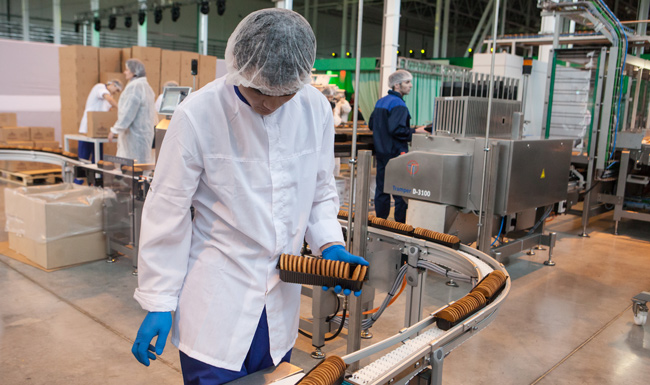
E-Invoicing and Its Geopolitical Stakes
France’s electronic invoicing reform relies on a Y-architecture, where Partner Dematerialization Providers (PDPs) play a central role in issuing and…
Generix Announces the Appointment of Olivier Vaillancourt as General Manager for North America View the press release

Climbing mountains is nothing new for food and beverage companies that, like most organizations, face a steady stream of new challenges in the course of business. Whether they’re complying with new regulations, adapting to changing consumer demands, or strengthening their supply chains against disruption, food and beverage companies have to stay on their toes or risk falling behind the curve.
Right now, some of the key issues that these organizations are facing include:
The list of challenges doesn’t end there, but these points paint a picture of an industry that’s still shaking off the impacts of the global pandemic while also looking for ways to work smarter, better, and faster in 2021 (and beyond).
As the coronavirus outbreak spread, unprecedented challenges have surfaced for food and beverage companies all over the world. Extraordinary measures have been taken to keep the food supply chain safe, efficient, and moving. Industry leaders with agile solutions in place have been able to mitigate some of the fallout from the pandemic, while others are still learning how to cope with the new realities of the crisis.
Regardless of where they land on the technology adoption curve, companies need to be able to quickly identify, configure/develop, and adopt new capabilities that ensure long-term organizational resiliency.
“COVID-19 has impacted the entire food and beverage (F&B) supply chain, from farm field to consumer,” DHL writes in Food Logistics. “It has upended the sector’s operational capacity in its entirety, including production, processing, packaging, and distribution.” COVID also caused a shift toward a greater need for efficiency in production amid the long-term realities of staff capacity shortages and an unpredictable regulatory environment, the freight provider points out.
The good news is that the global food supply chain nearly always shows resilience in the face of unanticipated challenges. Here are three steps that all food sector companies can take now to make their supply chains more resilient and responsible:
Focus on go-to-market versatility. Existing go-to-market channels like bars and restaurants could take months to fully recover from COVID-19. “Companies therefore need to invest in omnichannel capabilities, especially focusing on online/digital solutions,” Deloitte explains. “This should also include product [interchangeability] across channels.”
Step up end-to-end supply chain management. Work with a wider pool of suppliers, including regional ones, and keep larger strategic stocks. A broad product range is more expensive to maintain, but spreads risks, Deloitte acknowledges. “An alternative is to simplify recipes and/or remove problem products from the portfolio, resulting in a leaner, more manageable product range, less risk, and lower costs.”
Leverage technology ecosystems. Good supply chain visibility starts with a robust technology hub that includes a warehouse management system (WMS), transportation management system (TMS), yard management system (YMS), and order management system (OMS). It also includes Industry 4.0 technologies that provide advanced capabilities. “Digital supply networks are going to make businesses less vulnerable in the longer term,” Deloitte says. “Robots, for instance, reduce dependence on migrant labor, while track-and-trace solutions help businesses zoom in on supply chain bottlenecks.”
With the global pandemic still in full effect, companies across the food supply chain must plan for the continuing effects of the outbreak on different areas of supply, demand, and the overall economy. Using the strategies outlined above, companies can work to improve their supply chain resilience and visibility in a way that address the rigors of the current operating environment while also helping organizations prepare for the future. Generix Group North America has recently hosted a webinar Post Pandemic Impacts on the Food & Beverage Business featuring a guest speaker from Chapman’s Ice Cream, John Fleming. You can listen to the recording here and plan how to address supply chain resilience within your own organization.
Generix Group North America provides a series of solutions within our Supply Chain Hub product suite to create efficiencies across an entire supply chain. From Warehouse Management Systems (WMS) and Transportation Management Systems (TMS) to Manufacturing Execution Systems (MES) and more, software platforms can deliver a wide range of benefits that ultimately flow to the warehouse operator’s bottom line. We invite you to contact us to learn more.

France’s electronic invoicing reform relies on a Y-architecture, where Partner Dematerialization Providers (PDPs) play a central role in issuing and…

The B2B mandate in Germany, set to take effect on January 1, 2025, marks a crucial step in the European…

Following the October 15 announcement regarding the abandonment of the PPF development, the DGFIP and its partner AIFE are ramping…

Work with our team to build your ideal supply chain software stack and tailor it to your unique business needs.